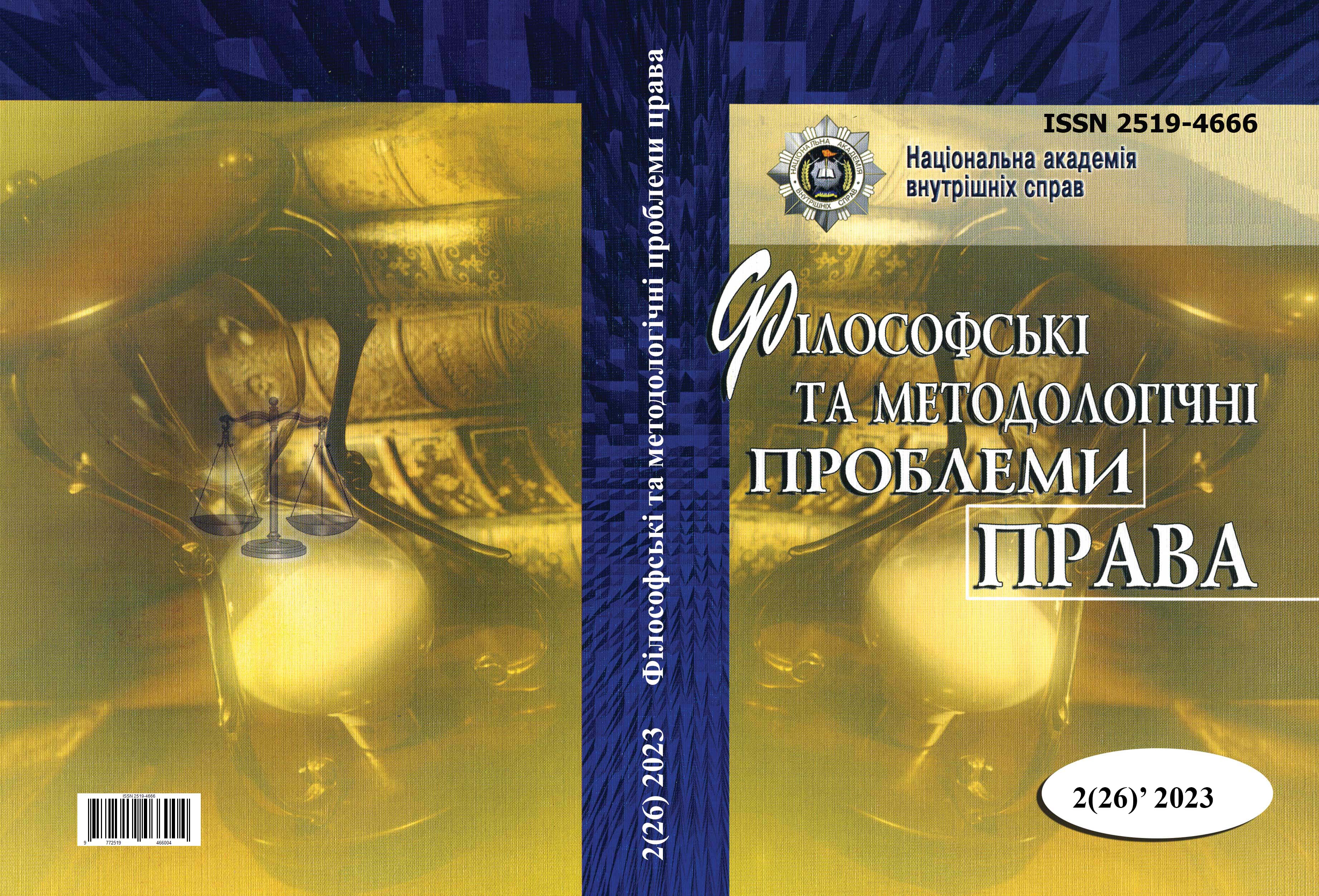Методологічні підходи в дослідженні обмежень прав людини
Анотація
Анотація. Визначення методологічного підходу є важливим етапом наукового дослідження, який обумовлює його зміст і висновки. Метою цієї статті є теоретичний аналіз (рефлексія) позитивного та природного праворозумінь, а отже, вибір оптимальних пізнавальних засобів визначення правомірності обмеження прав людини. Методологічною основою стали антропологічний та системний методи. Об’єкт дослідження зумовлює застосування герменевтичного й аксіологічного підходів. З огляду на багатоаспектність теми обмеження прав людини, наявність суперечливих позицій з цього питання, було використано методи діалектики. Науковою новизною публікації є твердження про необхідність у процесі дослідження питання обмеження прав людини застосовувати методи, притаманні як природному, так і позитивному праворозумінню за оптимального їх поєднання та акцентом на природності, пріоритетності й універсальності прав людини. Практична значущість дослідження полягає в тому, що запропонований у статті методологічний підхід щодо пошуку правової гармонії між позитивним і природним правом може бути використано під час розгляду правозастосовними органами питань щодо правомірності чи неправомірності обмежень прав людини, встановлених у законах.
Ключові слова: методологія; права людини; антропологія; герменевтика; цінності; позитивне праворозуміння; універсальність; лібералізм; комунітаризм.
Завантаження
Посилання
Aleksi, R. (2012). Dual nature of law. Problems of Philosophy of Law, VIII-IX, 19-29.
Bandura, O. (2018). Epistemology of law as a component of the philosophy of law. Philosophical and methodological problems of law, 1-2, 25-33.
Bandura, O.O. (2000). Unity of values and truth in law. Kyiv.
Bandura, O.O., Bublyk, S.A., & Zainchkovskyi, M.L. (et al.). (2000). Philosophy of law. M.V. Kostytskyi, B.F. Chmil (Eds.). Kyiv: Yurinkom Inter.
Bihun, V.S. (2011). Philosophy of justice: idea and implementation. Kyiv.
Bratasiuk, M.H. (2020). The philosophy of human rights protection from the standpoint of modern legal thinking. Philosophical and methodological problems of law, 1(19), 14-20. doi: 10.33270/02201901.14.
Danylian, O.H., Dzoban, O.P., & Maksymov, S.I. (et al.). (2009). Philosophy of law. O.H. Danilian (Eds.). Kharkiv: Pravo.
Holovatyi, S.P. (2016). About human rights. Kyiv: Dukh i litera.
Hryshchuk, O., & Sliusarchuk, H. (2018). Liberal communitarianism as a philosophy of legal development of postmodern society. Ukrainian Journal of Constitutional Law, 1, 19-27.
Hryshchuk, O.V. (2019. Philosophy of constitutional values. Kyiv: VAITE.
Hudyma, D.A. (2003). Philosophical and anthropological approach - the methodological foundation of modern legal science. Problems of the philosophy of law, I, 122-125.
Hudyma, D.A. (2009). Human rights: anthropological and methodological principles of research. Lviv: Krai.
Kostytskyi, M., & Kushakova-Kostytska, N. (2021). Integrity and unity in the ontology of the laws of existence and society. Philosophical and methodological problems of law, 1, 8-21. doi: 10.33270/02212101.8.
Kostytskyi, M.V. (2012). On Dialectic as a Methodology of Legal Science. Philosophical and methodological problems of law, 1, 3-17/
Kostytskyi, M.V. (2014). Positivism as a methodology of jurisprudence. Philosophical and methodological problems of law, 2, 16-35.
Kostytskyii, M., & Kushakova-Kostytska, N. (2023). Methodology of theoretical and practical knowledge in jurisprudence as a scientific-practical complex. Philosophical and methodological problems of law, 1(25), 9-17. doi: 10.33270/01232502.9.
Koziubra, M.I. (2021). The doctrine of natural law: through historical ups and downs to recognition as the basis of the most important achievements of modern legal theory and practice. Law of Ukraine, 1, 12-42.
Kravchenko, L.V. (1998). Justice as a choice. Kyiv: Molod.
Maksymov, S. (2009). The constitutional principle of the rule of law: general and special. Bulletin of the Academy of Legal Sciences of Ukraine, 3(58), 127-134.
Maksymov, S. (2013). Universality of human rights. Philosophy of law and general theory of law, 1, 110-117.
Maksymov, S. (2016). What is law? Key points of the concept of legal reality. Philosophy of law and general theory of law, 1-2, 343-351.
Maksymov, S.I. (2010). Philosophy of law: modern interpretations. Selected works: articles, analytical reviews, translations (2003–2010). Kharkiv: Pravo.
Pankevych, O. (2016). Philosophical and legal principles of limitation of human rights in international legal and constitutional acts. Scientific Bulletin of the Lviv State University of Internal Affairs, 1,
-383.
Petrova, L.V. (1997). Essays on modern western philosophy of law. Kharkiv.
Rabinovych, P., & Honcharov, V. (2021). Limits of law: main aspects of the problem. Philosophy of law and general theory of law, 2, 13-22. doi: 10.21564/2707-7039.2.269135.
Tsurkan-Saifulina, Yu. (2017). Modern interpretations of the natural-law doctrine regarding law and power. Jurnalul juridic naţional: teorie şi practică, 6-1(28), 19-24.
Переглядів анотації: 34 Завантажень PDF: 45
Авторське право (c) 2024 Філософські та методологічні проблеми права

Ця робота ліцензується відповідно до Creative Commons Attribution-NonCommercial-NoDerivatives 4.0 International License.
- Автори залишають за собою право на авторство власної праці та передають журналу право першої публікації цієї роботи на умовах ліцензії Creative Commons Attribution License, яка дає змогу іншим особам вільно розповсюджувати опубліковану працю з обов’язковим посиланням на авторів оригінальної роботи та першу публікацію статті в цьому журналі.
- Автори мають право укладати самостійні додаткові угоди щодо неексклюзивного розповсюдження роботи у тому вигляді, в якому вона була опублікована в журналі (наприклад, розміщувати статтю в репозитарії установи або публікувати у складі монографії), за умови збереження посилання на першу публікацію роботи у цьому журналі.
- Політика журналу дає змогу і заохочує розміщення авторами в Інтернеті (наприклад, у електронних сховищах установ або на особистих веб-сайтах) рукопису статті як до подання цього рукопису до редакції, так і під час його редакційного опрацювання, оскільки це сприяє продуктивній науковій дискусії та позитивно впливає на оперативність та динаміку цитування опублікованої роботи.




